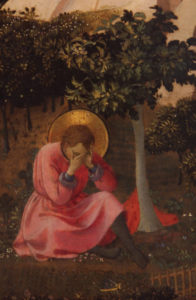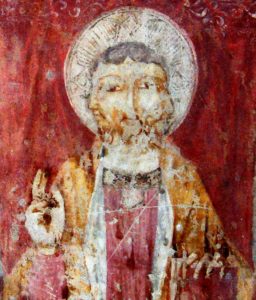 That Western atheists remain, at heart, Christians is evident from the realisation that Christianity is not only the dogmas of the Nicene Creed (Credo in unum Deum, Patrem omnipotentem, Factorem caeli et terrae, visibilium omnium et invisibilium, etc.), which atheists reject. Christianity is also the scale of values that took over the soul of the Aryan.
That Western atheists remain, at heart, Christians is evident from the realisation that Christianity is not only the dogmas of the Nicene Creed (Credo in unum Deum, Patrem omnipotentem, Factorem caeli et terrae, visibilium omnium et invisibilium, etc.), which atheists reject. Christianity is also the scale of values that took over the soul of the Aryan.
From this angle, Western atheists are even more Christian than theistic Christians, in that they have hypertrophied, and increasingly so in a downward spiral, the egalitarian, universalistic and individualistic morality of traditional Christianity to such levels that it is exterminating their race. A traditional Christian, like Matt Walsh, can see some of this psychosis (for example how gender ideology is destroying Western children). Atheists can’t even see it any more, insofar as they have taken dogmatic egalitarianism to levels that would have been considered insane even in the darkest moments of the Middle Ages.
Hitlerite Savitri Devi located the root of Christian and neo-Christian madness (i.e. atheistic hyper-Christianity) in the idea of man as bequeathed to us by the Bible. Other critics of the Bible who are not Hitlerists, such as our friend Gaedhal, have come to identical conclusions. In his statement today, Gaedhal said:
Thanks to technology, the earth, as regards humanity at least, is a single sympatria as regards human evolution. ‘Sympatric evolution’ is the antonym of ‘allopatric evolution’, allopatriae or distinct and separate human habitats no longer exist thanks to modern transportation. This is why I am a white globalist.
If humanity were any other animal, then blacks and whites would be considered different species. They might share a common genus or family. However, there is such a difference between the two—their skin: their largest organ are opposite colours!—that they would be classified as different species. Very few people believe both in evolution and in its implications and corollaries. Humanity, which is simply a genus of mammals, is special-pleaded. Again, I blame residual Christianity for this.
The reason why humanity is special-pleaded for is because there is a residual belief that the Jewish tribal god, Yahweh, specially created humanity, and breathed into us Cartesian-dualist ‘reasonable/rational souls’, and of course all of these Cartesian-dualist souls are equal. Soul equality is the basis for liberal secular equality.
The term, allopatric, is worth bearing in mind. Allos means ‘other’ in Greek; patria means ‘fatherland’ in Latin, and ‘-icus’ means ‘of’, ‘concerning’, ‘denoting’ in Latin. Thus, evolutio allopatrica, in Latin, is ‘allopatric evolution’. Etymologically, genetic changes ‘roll out’ through mutations and natural selection in two different habitats. Whites and Blacks have evolved allopatrically for hundreds of thousands of years.
What technology has done—and I agree with you [Dr Robert Morgan] on this—is that it has turned, for the human species at least, the entire planet into a single evolutionary habitat or patria. How anybody makes any sense of scientific terminology without knowing Greek and Latin is beyond me!
Whites have evolved in the European patria, or habitat, during this time, and blacks have developed in the sub-Saharan African habitat. In any other species that had two populations that evolved allopatrically for hundreds of thousands of years, then we would expect to see a considerable genetic divergence between these two populations. As Jerry Coyne points out: Whites hybridised with Homo Neanderthalis, whereas blacks did not.
So not only have whites evolved allopatrically, they have also hybridised! However, the one thing that we must not do is speculate on racial differences that may have evolved as a result of hundreds of thousands of years of allopatric evolution and hybridisation.
That is heresy!
As I said before: Woke scientists must possess a residual belief in Cartesian-dualist souls that were specially created equal. Woke scientists must have a residual belief that there is some god up there, on his celestial perch, magically making us all equal.
Sam Harris, I think, has come under fire for not recusing himself of the heresy of evolved racial differences with sufficient vigour. I follow the Woke Atheist site, Only Sky, which is great for its critiques of Christianity. They had an article, recently, about ‘The New Atheists and White Supremacy’. Charles Murray, in Wokism, is so heretical that he is excommunicatus vitandus, i.e. he is both ‘excommunicated and must be avoided’, just as Alfred Loisy was by the Catholic Church. Only Sky were criticising Richard Dawkins for not disassociating himself from Murray.
Woke atheists are not only egalitarian: they are fanatically egalitarian to the point of sabotaging Murray’s scientific lectures on IQ. Gaedhal is right that we must learn Greek and Latin, the languages of European high culture before the Judeo-Christian invasion. But even in plain language without Latin, it is possible to understand the above quote with these plain words of Jack Frost in a thread on The Occidental Observer eight years ago now:
Christians believe that the soul is eternal and always exists, either in heaven or in hell. Now, the soul is raceless and according to them the only important thing about a man; the body is dross, merely a shell. Why should someone who believes he is raceless and never going to die, and who is focused intently on things not of this world, but an anticipated next, worry himself about trivial matters such as the survival of Western civilization or this or that biological race? Clearly, to do so would be a heresy.
But even in plain English, the The Occidental Observer racialists didn’t listen to Frost because they were determined to combine the uncombinable: the religion of our parents with racial preservation.
The image at the top of this entry, by the way, illustrates St Augustine’s mental warfare and eventual conversion, which I used in my September 2015 post quoting Frost’s words. It is time for a tremendous internal struggle like the one that that Punic theologian suffered but, now, to reverse his theology and remain as we were before the Semitic infection that took over the empire.
 Several years ago for example I linked a YouTube audio in which William Pierce expressed precisely the idea that we could see the JQ in novel ways, and he said that one of those ways is that our societies have been allowing Jewish subversion. It is a pity that YouTube has cancelled all the channels that uploaded Pierce’s old podcasts. However, it shouldn’t be too difficult to find that specific podcast as it was originally aired in 2002, the year Pierce died.
Several years ago for example I linked a YouTube audio in which William Pierce expressed precisely the idea that we could see the JQ in novel ways, and he said that one of those ways is that our societies have been allowing Jewish subversion. It is a pity that YouTube has cancelled all the channels that uploaded Pierce’s old podcasts. However, it shouldn’t be too difficult to find that specific podcast as it was originally aired in 2002, the year Pierce died.




